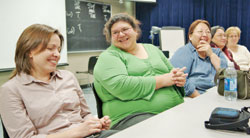Northern communities get reinforcement

Students share a laugh at a reception in the Applied Human Sciences Department’s brand new digs at Loyola. From left are: Daisy House, Brenda Pachanos-Sam, Marlene Matoush and Philomene Mianscum.
Photo by kate hutchinson
When the residential school system was abolished in northern native communities in the 1970s, the education system was turned over to the communities.
Native communities jumped at the chance to manage their own schools instead of having their children shipped to schools where they were punished for speaking their language, maintaining ties to their traditions, or even contacting their families. But the brand new educators needed support.
The Cree Family Life Education Certificate (Cree FLE) was developed through Concordia’s Applied Human Sciences (AHS) Department in the 1980s to help train and support student affairs technicians (SATs), who work with students, parents and teachers in northern Quebec school districts. Addressing the needs of SATs, who live in different communities hours away from each other, became the challenge.
According to Shirley Walker, an AHS teacher involved with the program since 1989, five of the program’s graduates have gone on to earn BAs and one has done an MA. Meanwhile, three of the current nine students are on the Dean’s list. One of them, Daisy House, has simultaneously earned a Bachelor of Education.
Students attend five-day intensive courses four times each year in Chisasibi, Montreal or Val d’Or (Quebec). This gives them an opportunity to connect with each other and faculty. Most of the time, students and faculty communicate with an e-classroom and telephone conversations. Some courses, like English language skills, are entirely offered on the Internet.
Late in 2005, the students met in Montreal for a course on trauma and healing for native communities with Jane Middleton-Moz, the author of several books dealing with trauma, bullying, suicide and addictions. Her work has helped communities deal with abuse connected to the residential school system.
Her course attracted several previous graduates. A reception on Nov. 29 allowed students both past and present to meet each other and teachers they may have only known via email.
This course was challenging since most of the students had been through the residential school system themselves. The material they covered was as relevant for them as for the families they work with.
“This issue has to be dealt with. It has not been talked about for too long, and it’s time to start healing,” said Bessie Tomatuk.
Tomatuk is offering a six-week program for high school students in Eastmain on alcoholism and its impact on families. She has seen how alcoholism is a problem for the students, keeping them out of school at times.
Her own experience with alcoholism led her to develop the program. “Next meeting, I think I’ll be able to share my own story. It used to be hard for me to do but now I’m comfortable with it.”
Tomatuk said confronting those issues can be difficult. “When I’m overwhelmed, I just find a computer and go to the e-classroom. Even if I don’t get a response right away, it feels good knowing that it will be read.”
Some of the issues raised by the students are not as personally painful, but do require a lot of confidence. Rose Sam Langer, one of the first graduates of the program, remembered facilitating a lecture on AIDS.
“I told the doctor not to look at me while I translated. Some words just don’t translate into Cree, and other words took a whole paragraph,” Sam Langer recollected, while the other students laughed, imagining the quiet woman’s discomfort. “Sex is a topic that’s not really talked about openly in our society,” she concluded.
Language is a critical part of the students’ education. House and Brenda Pachanos-Sam developed a program to encourage discussion while walking to shed pounds. “Just getting people to talk was complicated. Some have English and no Cree, others speak Cree and know just a little English,” House said.
Ultimately, the students become spokespeople within their communities. “We do ourselves out of a job,” said Walker, recognizing the role graduates play within their communities.
The students “are often juggling families, their work in schools, and when there’s a death, they all help out,” Walker said. House became a mother over the course of the program. Philomene Mianscum became a grandmother on the first day of the first Montreal course back in 2002. Graduate Nancy Scheshamuch is now a great-grandmother.
Despite the intrusion of life’s other responsibilities, the physical distance between the students, the rigors of the program and the occasional discomfort of raising difficult issues within the community, all of the students are happy with the program and appreciate its scope.
“I took some sociology courses before. Now that I’m finishing this program, I may want to go back,” Tomatuk said.

Standing left to right: Brenda Pachanos-Sam, Rhonda Buckland (TA), Shirley Walker (Project Administrator),Marlene Matoush, Bessie Tomatuk, Christine Cookish, Margaret Pachanos, Rosemary Reilly (Full time faculty instructor). Seated from left to right: Daisy House, Nancy Sheshamush, Edward Rabbitskin, Philomene Mianscum, Rose Sam Langer
Photo: Kate Hutchinson
Students and faculty who attended a reception in the Applied Human Sciences Department during their Montreal Cree Family Life Education course late last year.
